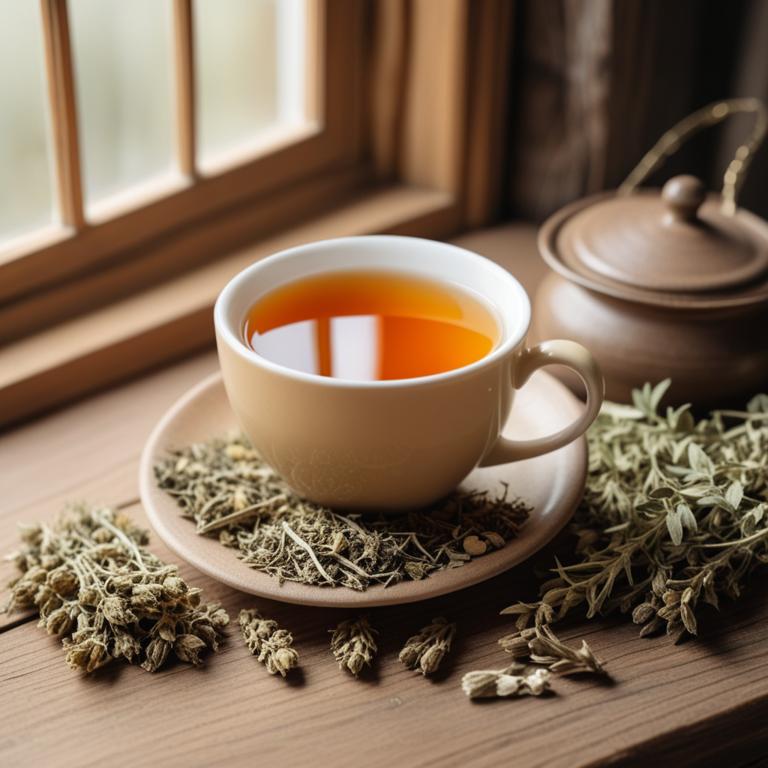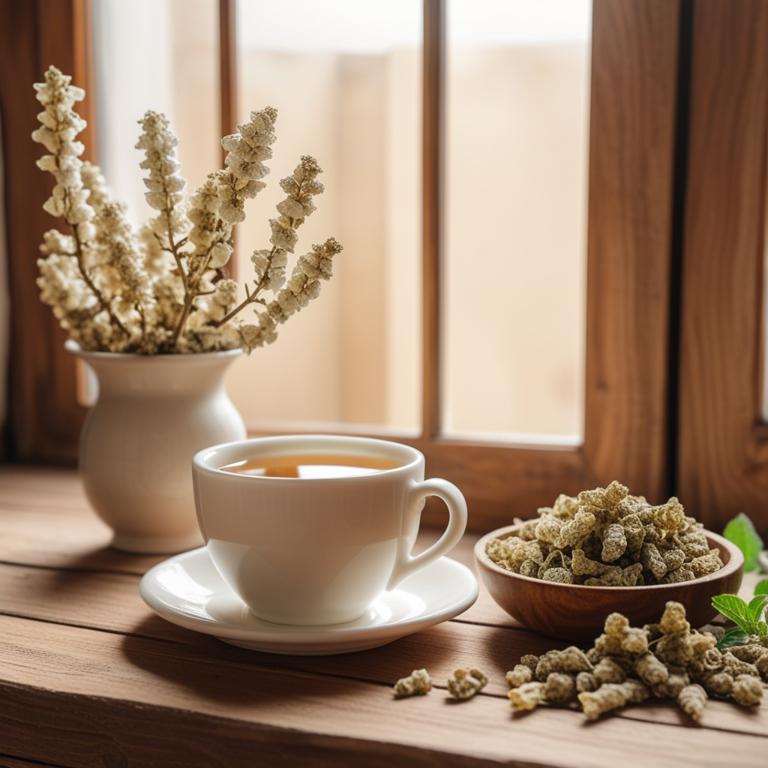9 Herbal Teas For Ankylosing Spondylitis

Herbal teas can be a helpful addition to your treatment plan for ankylosing spondylitis, a type of arthritis that causes chronic pain and stiffness in the spine.
Some herbs have anti-inflammatory properties that can help reduce swelling and ease symptoms. For example, Curcuma longa, also known as turmeric, contains a compound called curcumin that has potent anti-inflammatory and antioxidant effects. Drinking turmeric tea may help reduce joint pain and inflammation, making it easier to move and perform daily activities. Another herb that may help is Zingiber officinale, or ginger, which has natural anti-inflammatory compounds that can help reduce pain and stiffness. Ginger tea may also help reduce nausea and improve digestion, which can be beneficial for people with ankylosing spondylitis who may experience digestive problems due to medication.
Ginkgo biloba is another herb that may help with ankylosing spondylitis. It's known for its anti-inflammatory and antioxidant properties, which can help protect joints from damage and reduce pain. Drinking ginkgo biloba tea may also help improve circulation and reduce stiffness, making it easier to move and perform daily activities. Drinking herbal teas can bring many benefits to your life if you have ankylosing spondylitis. Not only can they help reduce pain and inflammation, but they can also promote relaxation and reduce stress. Many herbal teas, such as those made with turmeric, ginger, and ginkgo biloba, are easy to make at home and can be enjoyed hot or cold.
They can be a comforting and soothing addition to your daily routine, helping you manage your symptoms and improve your overall well-being.
- 1. Curcuma longa
- 2. Zingiber officinale
- 3. Ginkgo biloba
- 4. Glycyrrhiza glabra
- 5. Echinacea purpurea
- 6. Boswellia serrata
- 7. Silybum marianum
- 8. Cinchona officinalis
- 9. Withania somnifera
1. Curcuma longa

Curcuma longa teas contains curcuminoids, which are powerful antioxidants and anti-inflammatory compounds.
These compounds include demethoxycurcumin, bisdemethoxycurcumin, and curcumin, which have potent anti-inflammatory properties. Curcumin, the most active compound in turmeric, has been shown to reduce inflammation and prevent the progression of ankylosing spondylitis by inhibiting the production of pro-inflammatory enzymes. The anti-inflammatory properties of curcuma longa teas help to reduce joint pain and stiffness, and may also help to reduce the formation of new bone growth, a common symptom of ankylosing spondylitis.
By reducing inflammation and preventing new bone growth, curcuma longa teas may help to slow down the progression of ankylosing spondylitis.
- Get 1 tablespoon of dried Turmeric root powder.
- Boil 1 cup of water in a kettle or pot.
- Add the Turmeric powder to the boiling water and stir.
- Reduce heat to low and let it simmer for 5-7 minutes.
- Strain the tea and drink while warm, up to 2 times a day.
2. Zingiber officinale

Zingiber officinale teas contains compounds like gingerols and shogaols, which are responsible for its therapeutic properties.
These bioactive constituents have anti-inflammatory and antioxidant effects, helping to reduce inflammation and pain associated with ankylosing spondylitis. The gingerols and shogaols also have a pain-relieving effect, which can help alleviate the chronic pain experienced by people with this condition. Additionally, the antioxidants in ginger tea help protect the body from oxidative stress, which can contribute to inflammation and tissue damage.
By reducing inflammation and promoting relaxation, Zingiber officinale teas may help improve quality of life for individuals with ankylosing spondylitis.
- Gather 2 tablespoons of fresh or dried Zingiber officinale root.
- Boil 1 cup of water in a pot.
- Add the Zingiber officinale root to the boiling water.
- Let it steep for 5-7 minutes, then strain the tea.
- Drink 1-2 cups of the tea, 2-3 times a day, as needed.
Zingiber Officinale Tea on Amazon
FGO Organic Ginger Tea, 100 Count, Eco-Conscious Tea Bags, Caffeine Free, Packaging May Vary (Pack of 1)
Disclaimer: We earn a commission if you click this link and make a purchase at no additional cost to you.
3. Ginkgo biloba

Ginkgo biloba teas contains flavonoids and terpenoids as its bioactive constituents.
These compounds have anti-inflammatory properties that help reduce inflammation and pain associated with ankylosing spondylitis. The flavonoids in Ginkgo biloba tea, such as quercetin and kaempferol, act as antioxidants and help protect the body's tissues from damage caused by free radicals. The terpenoids, including ginkgolides and bilobalide, have anti-inflammatory effects that help reduce the production of pro-inflammatory cytokines and enzymes involved in the disease process.
By reducing inflammation and oxidative stress, Ginkgo biloba tea may help alleviate symptoms of ankylosing spondylitis, such as joint pain and stiffness.
- Gather 1 cup of water, 1 teaspoon of dried Ginkgo biloba leaves, and a tea infuser or strainer.
- Heat the water in a pot until it boils. Let it cool for a minute.
- Add the dried Ginkgo biloba leaves to the tea infuser or strainer.
- Steep the leaves in the water for 5-7 minutes. Strain the tea into a cup.
- Drink 1-2 cups of the Ginkgo biloba tea 2-3 times a day for ankylosing spondylitis relief.
4. Glycyrrhiza glabra

Glycyrrhiza glabra teas contains licorice root, which has anti-inflammatory properties thanks to its main bioactive constituents, glycyrrhizic acid and flavonoids.
These compounds help reduce inflammation and pain in the joints and spine. Glycyrrhizic acid blocks the production of molecules that cause inflammation, such as prostaglandins and leukotrienes. Flavonoids, on the other hand, have antioxidant properties that help protect against cell damage and promote healing.
By reducing inflammation and promoting healing, Glycyrrhiza glabra teas may help alleviate symptoms of ankylosing spondylitis, such as back pain and stiffness.
- Gather ingredients: 2 cups of water, 1 tablespoon of dried Glycyrrhiza glabra root, and a tea infuser or strainer.
- Boil the water in a pot and then let it cool for 1-2 minutes to avoid high temperature.
- Place the dried root in the tea infuser or strainer and put it into the pot with the cooled water.
- Let the mixture steep for 5-7 minutes, then remove the root and discard it.
- Drink the tea while it's still warm, ideally 1-2 cups a day, as part of a healthy diet and ankylosing spondylitis treatment plan.
5. Echinacea purpurea

Echinacea purpurea teas contains bioactive constituents like alkylamides, caffeic acid derivatives, and flavonoids.
These compounds have anti-inflammatory properties that can help reduce the inflammation associated with ankylosing spondylitis, a chronic inflammatory disease that affects the spine. The flavonoids, particularly kaempferol and quercetin, have been shown to inhibit the production of pro-inflammatory cytokines, which are molecules that promote inflammation. The alkylamides in Echinacea purpurea also have immunomodulatory effects, helping to regulate the immune system's response to inflammation.
By reducing inflammation and modulating the immune system, Echinacea purpurea teas may help alleviate symptoms of ankylosing spondylitis, such as pain, stiffness, and limited mobility.
- Gather 2 tablespoons of dried Echinacea purpurea root, 1 tablespoon of dried Echinacea purpurea flowers, and 1 cup of boiling water.
- Combine the dried Echinacea purpurea root and flowers in a tea infuser or a heat-resistant cup.
- Pour the boiling water over the Echinacea mixture, cover the cup, and let it steep for 5-7 minutes.
- Strain the tea into another cup using the tea infuser or a piece of cheesecloth, and discard the solids.
- Drink 1 cup of the Echinacea tea 2-3 times a day to help manage ankylosing spondylitis symptoms.
6. Boswellia serrata

Boswellia serrata teas contains boswellic acids, which are the active constituents that help with ankylosing spondylitis.
These acids have anti-inflammatory and anti-arthritic properties that reduce swelling and pain in the joints. The boswellic acids also inhibit the production of pro-inflammatory enzymes, such as COX-2 and 5-LOX, which contribute to joint inflammation. Additionally, boswellia serrata teas has been found to reduce the production of tumor necrosis factor-alpha, a protein that promotes inflammation and joint damage.
By reducing inflammation and joint damage, boswellia serrata teas may help manage ankylosing spondylitis symptoms and improve quality of life.
- Boil 1 cup of water in a pot.
- Measure 1 teaspoon of Boswellia serrata powder into a tea infuser.
- Pour the boiled water over the tea infuser.
- Let it steep for 5-7 minutes, then remove the infuser.
- Drink the tea while it's still warm, 2-3 times a day, as directed by your doctor.
7. Silybum marianum

Silybum marianum teas contains silymarin, a bioactive constituent that has anti-inflammatory properties, which can help alleviate the joint pain and swelling associated with ankylosing spondylitis.
Silymarin also has antioxidant properties that can protect the body from oxidative stress, a known contributor to inflammation and tissue damage in the condition. The flavonoids present in silymarin, including kaempferol and isorhapontigenin, have been shown to inhibit the production of pro-inflammatory cytokines, which are molecules that promote inflammation. Additionally, silymarin has been found to improve the integrity of the epithelial barrier, which can help prevent intestinal permeability and reduce the severity of symptoms.
By reducing inflammation and protecting the body from oxidative stress, Silybum marianum teas may help manage the symptoms of ankylosing spondylitis and improve quality of life.
- Gather 1 cup of dried Silybum marianum flowers. You can buy them at a health food store or online.
- Measure out 1 tablespoon of dried Silybum marianum flowers and place them in a tea infuser or a heat-resistant cup.
- Boil 1 cup of water and pour it over the Silybum marianum flowers in the tea infuser or cup.
- Steep the tea for 5-7 minutes. Strain the tea into another cup to remove the flowers.
- Drink 1 cup of the Silybum marianum tea 2-3 times a day, as needed. Consult with a doctor before using it for ankylosing spondylitis treatment.
8. Cinchona officinalis

Cinchona officinalis teas contains compounds like quinine, quinidine, and cinchonine.
These alkaloids have anti-inflammatory properties, which can help reduce the swelling and pain associated with ankylosing spondylitis. The antipyretic properties of quinine and quinidine can also help lower the body's temperature, reducing heat and pain in the joints and spine. Additionally, cinchonine has been shown to have antioxidant properties, which can help protect the body from oxidative stress caused by inflammation.
By reducing inflammation and oxidative stress, Cinchona officinalis teas may help alleviate symptoms of ankylosing spondylitis.
- Gather 2 tablespoons of dried Cinchona officinalis bark and 1 cup of water.
- Boil the water in a saucepan and then reduce the heat to low.
- Add the dried Cinchona officinalis bark to the water and let it steep for 5-7 minutes.
- Strain the mixture into a cup and discard the bark.
- Drink the tea 2-3 times a day as needed for ankylosing spondylitis relief.
9. Withania somnifera

Withania somnifera teas contains bioactive constituents like withanolides, alkaloids, and glycosides that help reduce inflammation and pain associated with ankylosing spondylitis.
These compounds have anti-inflammatory and antioxidant properties, which can help alleviate the symptoms of the condition. The withanolides in Withania somnifera teas have been shown to inhibit the production of pro-inflammatory cytokines, which contribute to the inflammation and joint damage seen in ankylosing spondylitis. Additionally, the antioxidant properties of Withania somnifera teas help protect the joints from oxidative stress, which can slow down the progression of the disease.
Regular consumption of Withania somnifera teas may help reduce the frequency and severity of ankylosing spondylitis symptoms, improving quality of life for those affected.
- Gather 2 teaspoons of dried Withania somnifera root powder.
- Heat 1 cup of water in a kettle or on the stove.
- Pour the hot water over the Withania somnifera root powder in a cup.
- Let the mixture steep for 5-7 minutes, then strain it.
- Drink the tea 2-3 times a day, preferably before meals.